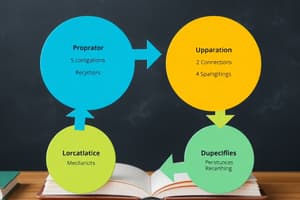Podcast
Questions and Answers
Which type of education specifically includes structured learning and follows a set curriculum?
Which type of education specifically includes structured learning and follows a set curriculum?
- Non-formal Education
- Formal Education (correct)
- Informal Education
- Extracurricular Education
What is a key characteristic of informal education?
What is a key characteristic of informal education?
- It is often self-directed and experiential. (correct)
- It is limited to community workshops.
- It takes place in organized school settings.
- It always leads to formal qualifications.
At what age range does primary education typically occur?
At what age range does primary education typically occur?
- 12-18 years
- 18+ years
- 0-5 years
- 6-12 years (correct)
Which of the following is NOT a benefit of education?
Which of the following is NOT a benefit of education?
What is the primary focus of early childhood education?
What is the primary focus of early childhood education?
Which component of education involves measuring student learning?
Which component of education involves measuring student learning?
What trend in education emphasizes diversity and equity in learning environments?
What trend in education emphasizes diversity and equity in learning environments?
What does Lifelong Learning promote?
What does Lifelong Learning promote?
Flashcards are hidden until you start studying
Study Notes
Definition of Education
- Process of acquiring knowledge, skills, values, and beliefs.
- Typically occurs through formal or informal instruction.
Types of Education
-
Formal Education
- Structured learning in schools, colleges, and universities.
- Follows a curriculum with set standards and assessments.
-
Informal Education
- Learning that occurs outside formal institutions.
- Includes life experiences, self-directed learning, and community engagement.
-
Non-formal Education
- Organized, but not within the formal school system.
- Examples include adult education, vocational training, and community programs.
Levels of Education
-
Early Childhood Education
- Focuses on children from birth to age six.
- Emphasizes play-based and exploratory learning.
-
Primary Education
- Basic education for children typically ages 6-12.
- Core subjects include literacy, numeracy, and social studies.
-
Secondary Education
- Provides broader knowledge for ages 12-18.
- Includes both academic and vocational tracks.
-
Higher Education
- Post-secondary education at universities or colleges.
- Awards degrees such as associate, bachelor’s, master’s, and doctorate.
Key Concepts in Education
-
Curriculum Development
- Process of designing and organizing educational content.
- Ensures alignment with educational standards and outcomes.
-
Assessment and Evaluation
- Methods to measure student learning and educational effectiveness.
- Includes formative (ongoing) and summative (end-point) assessments.
-
Pedagogy
- Art and science of teaching.
- Involves instructional strategies, classroom management, and learner engagement.
Importance of Education
- Contributes to personal development, self-esteem, and critical thinking.
- Promotes economic growth by providing a skilled workforce.
- Fosters social cohesion and reduces inequalities in society.
Current Trends in Education
-
Technology Integration
- Use of digital tools and resources in learning environments.
- Enhances access to information and learning opportunities.
-
Inclusive Education
- Ensures all learners, regardless of background or ability, receive quality education.
- Emphasizes diversity and equity in educational settings.
-
Lifelong Learning
- Encouragement of continual personal and professional development throughout life.
- Recognizes the importance of adaptability to changing job markets.
Challenges in Education
- Accessibility and equity in education opportunities.
- Quality of teaching and learning resources.
- Balancing standardization with personalized education approaches.
Education Definition
- The process of acquiring knowledge, skills, values, and beliefs.
- Typically occurs through formal or informal means, often involving instruction.
Types of Education
- Formal education: Occurs in schools, colleges, and universities. Follows a set curriculum with standards and assessments.
- Informal education: Learning happens outside formal institutions, including life experiences, self-directed learning, community engagement.
- Non-formal education: Organized learning outside the formal school system, like adult education, vocational training, or community programs.
Levels of Education
- Early childhood education: Focuses on children from birth to age six, emphasizing play-based and exploratory learning.
- Primary education: Basic education for children ages 6-12, covering literacy, numeracy, and social studies.
- Secondary education: Broadens knowledge between ages 12-18, offering both academic and vocational tracks.
- Higher education: Post-secondary education at universities or colleges, awarding associate, bachelor's, master's, and doctorate degrees.
Key Concepts in Education
- Curriculum development: Designing and organizing educational content, aligning it with educational standards and desired outcomes.
- Assessment and evaluation: Measuring student progress and program effectiveness, using formative (ongoing) and summative (end-point) methods.
- Pedagogy: The art and science of teaching, including instructional strategies, classroom management, and student engagement techniques.
Importance of Education
- Contributes to personal growth, self-esteem, and critical thinking.
- Fuels economic growth by providing a skilled workforce.
- Promotes social cohesion and reduces societal inequalities.
Current Trends in Education
- Technology Integration: Leverages digital tools and resources in learning environments, expanding access to information and learning opportunities.
- Inclusive Education: Ensures all learners, regardless of background or ability, receive quality education, emphasizing diversity and equity.
- Lifelong Learning: Encourages continuous personal and professional development throughout life, fostering adaptability in evolving job markets.
Challenges in Education
- Ensuring accessibility and equity in educational opportunities.
- Maintaining quality of teaching and learning resources.
- Balancing standardized approaches with personalized educational needs.
Studying That Suits You
Use AI to generate personalized quizzes and flashcards to suit your learning preferences.




